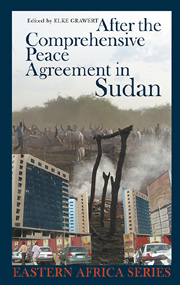Book contents
- Frontmatter
- Contents
- List of Tables & Figures
- Editor's Preface
- Notes on Contributors
- List of Acronyms
- Map of Sudan
- 1 Introduction
- I Implementation & Potential of the CPA
- 2 The Role of African & Arab Elites in Building a New Sudan
- 3 After the CPA
- 4 Empowered Deliberative Democracy (EDD)
- II Challenges Facing Post-war Societies in Sudan
- III The CPA in its Sub-regional Context
- IV Beyond the CPA
- Index
- EASTERN AFRICAN STUDIES
4 - Empowered Deliberative Democracy (EDD)
A Start from the Bottom
from I - Implementation & Potential of the CPA
Published online by Cambridge University Press: 05 April 2013
- Frontmatter
- Contents
- List of Tables & Figures
- Editor's Preface
- Notes on Contributors
- List of Acronyms
- Map of Sudan
- 1 Introduction
- I Implementation & Potential of the CPA
- 2 The Role of African & Arab Elites in Building a New Sudan
- 3 After the CPA
- 4 Empowered Deliberative Democracy (EDD)
- II Challenges Facing Post-war Societies in Sudan
- III The CPA in its Sub-regional Context
- IV Beyond the CPA
- Index
- EASTERN AFRICAN STUDIES
Summary
Introduction
The CPA has given emphasis to the issues of wealth and power sharing rather than the appropriate political system within which wealth and power sharing should take place. If the two partners of the agreement, the NCP and SPLM, had taken the other way round, i.e. considered the political system first, the CPA would have been more comprehensive and, in a practical way, the partners would have entered the discussion about the mutual/dialectical relationship between the existence/absence of democracy and the existence/absence of peace.
Popular political participation is the core characteristic of democracy. Although Sudan's democratic regimes came to power through popular uprisings against military rule in 1964 as well as in 1985, the country's political dynamics have repeatedly led to elitist and centralised democracies instead of participatory democracy. This type of democracy has failed to be an effective and sustainable system of governance; it has enhanced the concentration of wealth and power in the urban/centre elitist domains and caused continuous civil war. This chapter argues that it has been the absence of popular participation that made the three democracies in Sudan (1956–8, 1964–9 and 1986–9) instruments or formulas for maintaining the hegemony of the centre over the rest of the country, of the north over the south, and of the elite over the general population.
Sudan faces the three structural and connected problems of uneven development, a deficient political system, and civil wars. Hence, the resolution towards even development, sustainable peace and good democratic governance must also be structural: building an appropriate political system that can make development even and stop civil strife and war.
- Type
- Chapter
- Information
- After the Comprehensive Peace Agreement in Sudan , pp. 62 - 80Publisher: Boydell & BrewerPrint publication year: 2010



